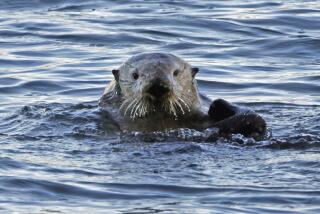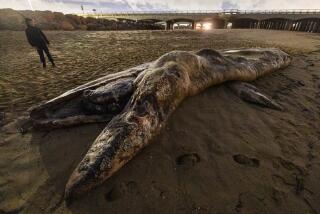Body of abalone diver washes up on California beach
The body of an abalone diver was recovered Tuesday more than a week after he went missing off the coast of Mendocino County, authorities said.
A beach visitor was checking surf conditions at Moat Creek Beach in Point Arena and found David Tan Le’s body lying face down at water’s edge, said Lt. Greg Stefani of the Mendocino County Sheriff’s Office.
Sheriff’s officials believe Le’s body was dragged out to sea and later washed up on the beach. He was still wearing his wetsuit, a weight belt and dive mask.
The 57-year Oakland man and several friends and relatives were searching for abalone about 8 a.m. on May 9 near the beach.
See the most-read stories this hour >>
But the group became concerned when Le did not return from the water. They searched the area and called authorities, Stefani said.
Mendocino County search-and-rescue volunteers and California Department of Fish and Wildlife maritime wardens searched the ocean for Le for days, but couldn’t find him.
At times, hazardous sea conditions made certain areas inaccessible for divers.
Le is among a growing number of people who have died while diving for abalone along the Northern California coast.
Diver Yoshihiro Ohhashi, 57, of Pleasanton went missing in August after he was overcome by rough seas while looking for abalone off the Mendocino coast.
The rugged coasts of Marin, Sonoma and Mendocino counties draw thousands of divers during abalone season, which runs from April 1 to Nov. 30. Northern California is home to the only ongoing abalone fishery in the state.
Join the conversation on Facebook >>
In 2014, 148,000 abalone were picked, which is down from the annual average catch of 210,000.
Abalone cling to rocks, where they feed on kelp and other algae, according to the California Department of Fish and Wildlife. It takes years for long-lived abalone to grow to a legal size for harvest. The minimum size limit is 7 inches along the longest shell diameter — anything smaller must be returned to the rock surface from which it was removed.
Red Abalone has come under stress in the last two years due to warm water conditions, according to Fish and Wildlife. The warm ocean temperatures have reduced kelp production, resulting in leaner abalone.
For breaking news in California, follow VeronicaRochaLA on Twitter.
ALSO
Concern over birds delays decision on official Orange County dog beach
Water conservation will ease in parts of California, worsen in other parts
Black bear up a tree in Rancho Cucamonga triggers school lockdown
More to Read
Start your day right
Sign up for Essential California for news, features and recommendations from the L.A. Times and beyond in your inbox six days a week.
You may occasionally receive promotional content from the Los Angeles Times.





